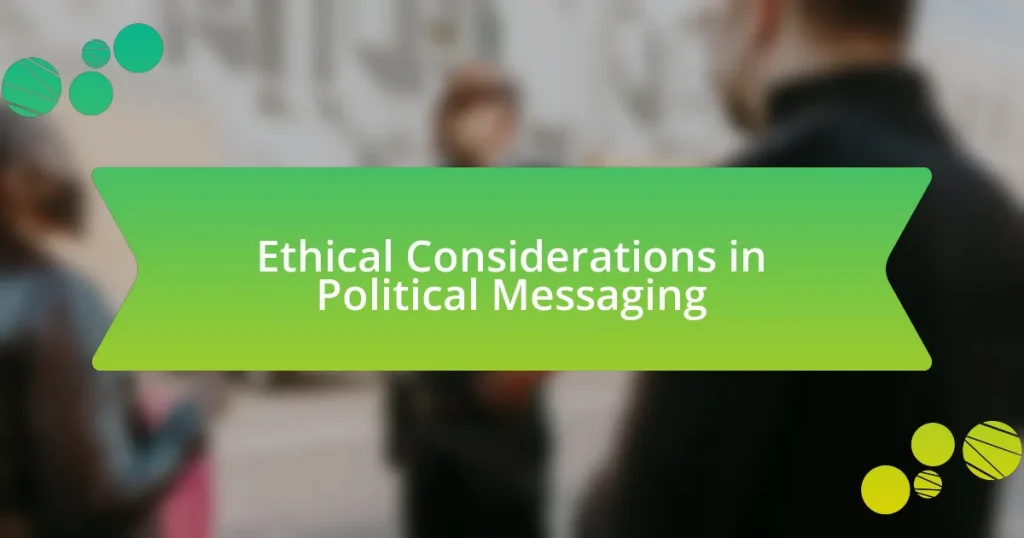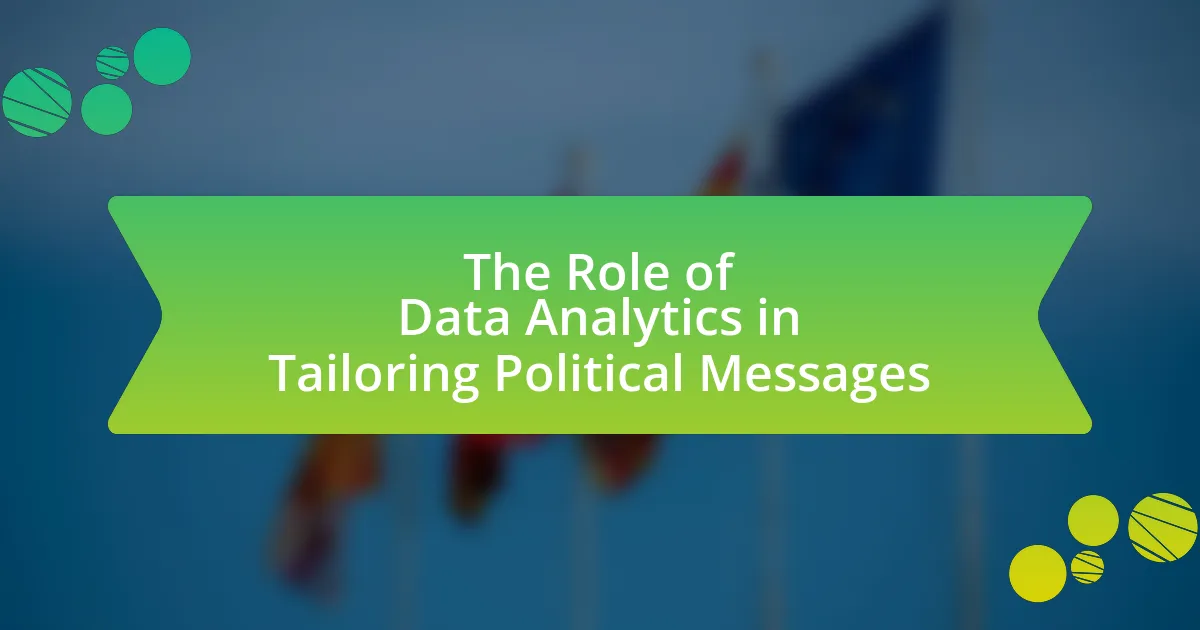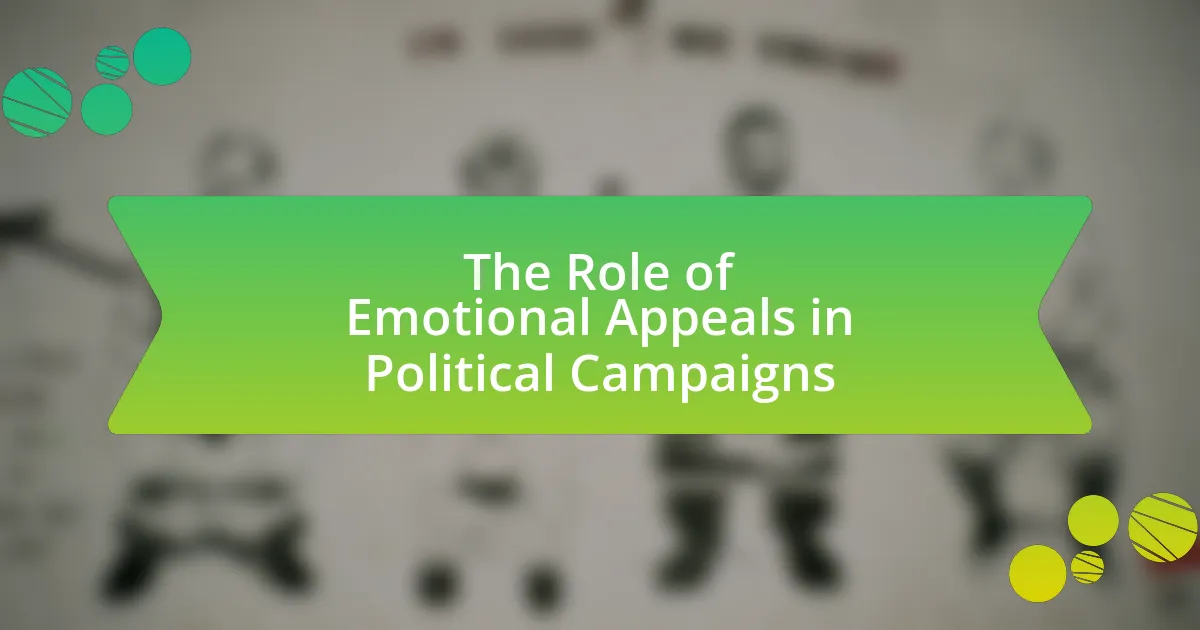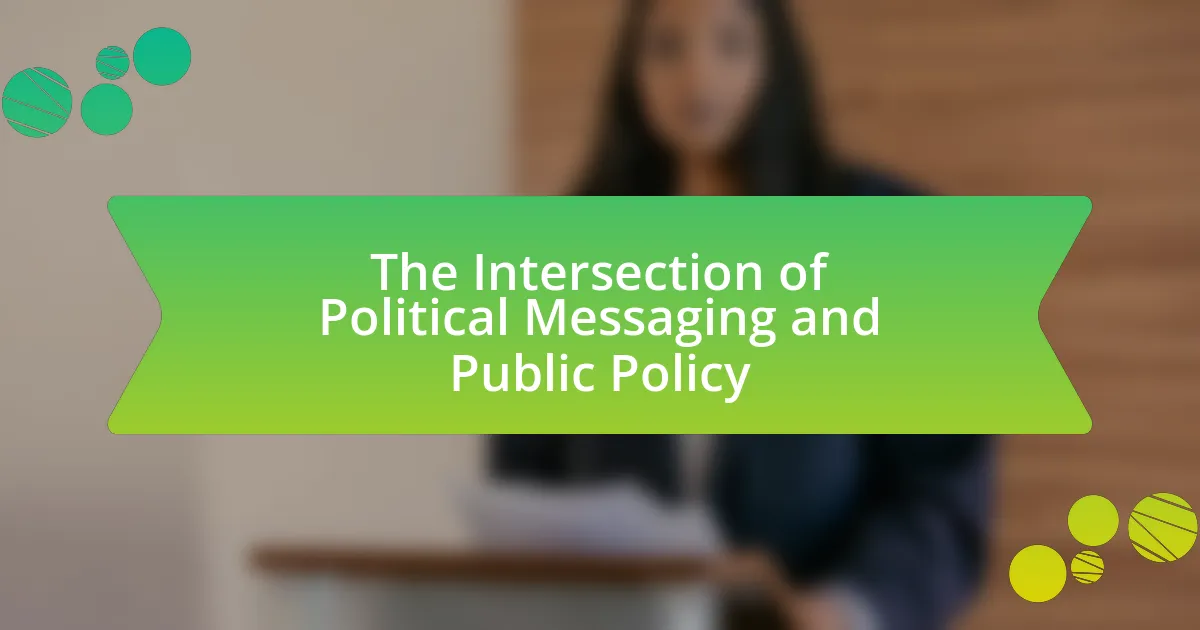The article focuses on ethical considerations in political messaging, emphasizing the importance of honesty, transparency, and respect for the audience. It outlines how ethical standards are crucial for maintaining public trust and integrity in political discourse, highlighting the negative consequences of unethical practices such as misinformation and manipulation. Key principles guiding ethical messaging include accountability and respect for diverse viewpoints, while the impact of social media and legal frameworks on political communication is also examined. Additionally, the article discusses best practices for political campaigns to ensure ethical messaging and the role of voters in promoting accountability and transparency.
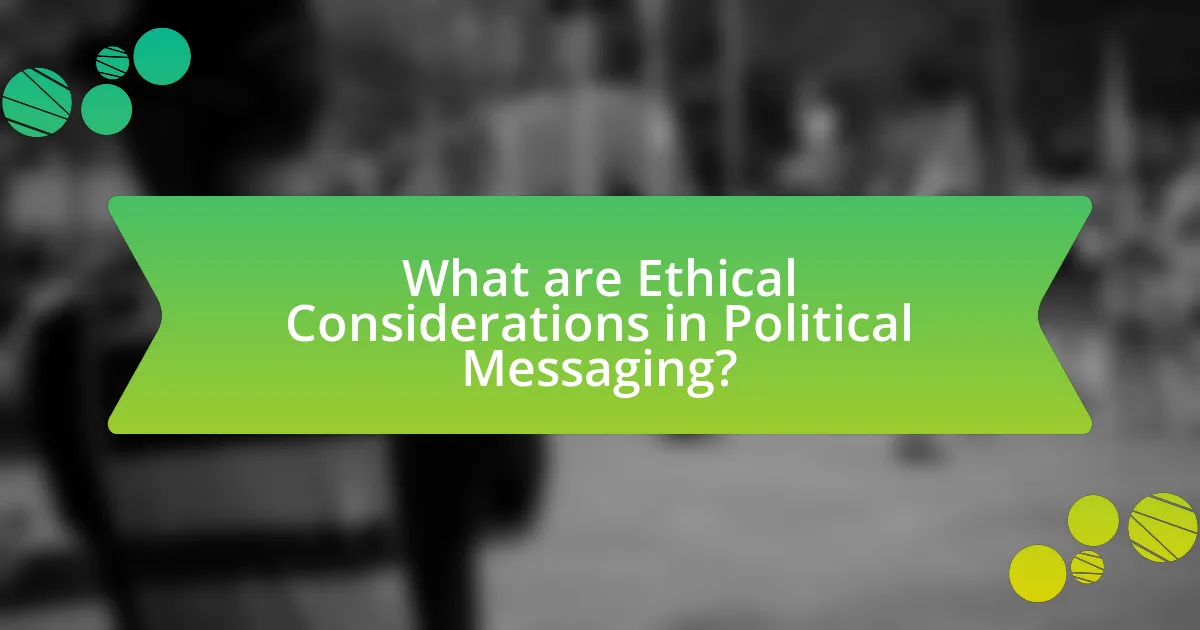
What are Ethical Considerations in Political Messaging?
Ethical considerations in political messaging include honesty, transparency, and respect for the audience’s intelligence. Political messaging must avoid manipulation, misinformation, and exploitation of emotions, as these practices can undermine democratic processes and erode public trust. For instance, the spread of false information during elections has been shown to significantly influence voter behavior, as evidenced by studies conducted during the 2016 U.S. presidential election, which highlighted the impact of misleading social media campaigns on public perception. Therefore, adhering to ethical standards in political messaging is crucial for maintaining integrity in political discourse and fostering informed citizen engagement.
Why is ethics important in political messaging?
Ethics is important in political messaging because it fosters trust and credibility between politicians and the public. When political messages adhere to ethical standards, they promote transparency and accountability, which are essential for a healthy democracy. For instance, research by the Pew Research Center indicates that 70% of Americans believe that honesty is crucial for political leaders, highlighting the public’s demand for ethical communication. Ethical political messaging also helps prevent misinformation, which can lead to voter manipulation and undermine democratic processes. Therefore, maintaining ethical standards in political messaging is vital for sustaining public trust and ensuring informed decision-making among voters.
What ethical principles should guide political messaging?
Political messaging should be guided by principles of honesty, transparency, respect, and accountability. Honesty ensures that information presented is accurate and not misleading, which is crucial for informed decision-making by the electorate. Transparency involves openly sharing the sources of information and the motivations behind messages, fostering trust between politicians and the public. Respect entails acknowledging diverse viewpoints and engaging in civil discourse, which is essential for a healthy democratic process. Accountability requires political actors to take responsibility for their messaging and its impact, ensuring that they are answerable to the public for their claims and actions. These principles are supported by ethical frameworks in political communication, such as the Society of Professional Journalists’ Code of Ethics, which emphasizes the importance of truth and fairness in public discourse.
How do ethical considerations impact public trust?
Ethical considerations significantly impact public trust by shaping perceptions of integrity and accountability in political messaging. When political entities adhere to ethical standards, they foster transparency and honesty, which enhances public confidence. For instance, a study by the Pew Research Center found that 70% of Americans believe that ethical behavior in politics is crucial for maintaining trust in government. Conversely, unethical practices, such as misinformation or manipulation, erode trust and lead to skepticism among the public. Therefore, ethical considerations serve as a foundation for building and sustaining public trust in political communication.
What are the potential consequences of unethical political messaging?
Unethical political messaging can lead to significant consequences, including the erosion of public trust in political institutions. When politicians or parties engage in misleading or deceptive communication, it undermines the credibility of the political system, as evidenced by studies showing that misinformation can decrease voter turnout and increase polarization among the electorate. For instance, a 2020 study published in the journal “Political Communication” found that exposure to false information negatively impacted individuals’ perceptions of political candidates and their willingness to participate in elections. Additionally, unethical messaging can incite social unrest, as seen in various instances where inflammatory rhetoric has led to protests or violence. Overall, the ramifications of unethical political messaging extend beyond individual elections, affecting the broader democratic process and societal cohesion.
How can misinformation affect voter behavior?
Misinformation can significantly distort voter behavior by shaping perceptions and influencing decision-making processes. When voters are exposed to false or misleading information, it can lead to misguided beliefs about candidates, policies, or electoral processes. For instance, a study by the Pew Research Center found that 64% of Americans believe that misinformation has a major impact on their understanding of political issues, which can result in altered voting preferences and decreased voter turnout. This manipulation of information undermines the democratic process by creating an environment where decisions are based on inaccuracies rather than facts.
What role does transparency play in ethical political messaging?
Transparency is crucial in ethical political messaging as it fosters trust between politicians and the electorate. When political messages are clear and open about intentions, sources, and funding, they enable voters to make informed decisions. Research indicates that transparency reduces misinformation and enhances accountability, as seen in studies by the Pew Research Center, which found that 70% of voters value transparency in political communication. This trust is essential for a healthy democracy, as it encourages civic engagement and participation.

How do different political contexts influence ethical messaging?
Different political contexts significantly influence ethical messaging by shaping the values, norms, and expectations surrounding communication. For instance, in democratic societies, ethical messaging often emphasizes transparency and accountability, as seen in the ethical guidelines established by organizations like the American Political Science Association, which advocate for honesty in political discourse. Conversely, in authoritarian regimes, ethical messaging may prioritize loyalty to the state over truthfulness, leading to propaganda that distorts facts to maintain control, as evidenced by the practices in North Korea where state media disseminates government-approved narratives. These variations illustrate how political environments dictate the ethical frameworks within which messaging operates, impacting the integrity and reception of political communication.
What ethical challenges arise in campaign messaging?
Ethical challenges in campaign messaging include misinformation, manipulation of emotions, and lack of transparency. Misinformation can mislead voters, as seen in the 2016 U.S. presidential election where false information spread rapidly on social media, influencing public perception. Manipulation of emotions often occurs through fear-based tactics, which can distort rational decision-making. Additionally, lack of transparency regarding funding sources and the intentions behind messages can undermine trust in the political process, as highlighted by studies showing that voters are more skeptical of messages from undisclosed sources. These challenges raise significant concerns about the integrity and fairness of democratic processes.
How do cultural differences shape ethical standards in political messaging?
Cultural differences significantly shape ethical standards in political messaging by influencing perceptions of honesty, respect, and appropriateness in communication. For instance, in collectivist cultures, political messaging often emphasizes community values and harmony, leading to ethical standards that prioritize group consensus over individual opinions. In contrast, individualistic cultures may value transparency and directness, resulting in ethical norms that support open debate and personal expression. Research by Hofstede (1980) highlights these cultural dimensions, demonstrating that societies with high power distance may accept hierarchical messaging, while those with low power distance advocate for egalitarian communication. Thus, cultural contexts dictate the ethical frameworks that govern political messaging, affecting how messages are crafted and received.
What are the implications of social media on ethical political communication?
Social media significantly impacts ethical political communication by facilitating rapid information dissemination while also enabling the spread of misinformation. The immediacy of social media platforms allows political messages to reach large audiences quickly, which can enhance engagement and participation in democratic processes. However, this same speed can lead to the unverified sharing of false information, undermining the integrity of political discourse. For instance, a study by the Pew Research Center found that 64% of Americans believe that social media has a mostly negative effect on the way things are going in the country today, highlighting concerns about misinformation and its influence on public opinion. Additionally, the algorithms used by social media platforms often prioritize sensational content, which can distort political communication and lead to polarization. Thus, while social media can enhance political engagement, it also poses significant ethical challenges that must be addressed to ensure responsible communication.
How do laws and regulations affect ethical political messaging?
Laws and regulations significantly shape ethical political messaging by establishing boundaries for truthful communication and protecting against misinformation. For instance, the Federal Election Commission enforces rules that require transparency in campaign financing, ensuring that voters are informed about the sources of political funding. Additionally, laws against false advertising and deceptive practices compel political entities to present accurate information, thereby promoting ethical standards in messaging. These regulations are designed to uphold democratic integrity and foster public trust, as evidenced by the enforcement actions taken against campaigns that violate these standards, which can lead to penalties and loss of credibility.
What legal frameworks exist to promote ethical standards in political messaging?
Legal frameworks that promote ethical standards in political messaging include campaign finance laws, truth-in-advertising regulations, and anti-defamation statutes. Campaign finance laws, such as the Federal Election Campaign Act in the United States, regulate the funding of political campaigns to ensure transparency and limit the influence of money in politics. Truth-in-advertising regulations, enforced by the Federal Trade Commission, require that political advertisements are not misleading and provide accurate information. Anti-defamation statutes protect individuals and organizations from false statements that could harm their reputation, thereby encouraging responsible communication in political discourse. These frameworks collectively aim to uphold integrity and accountability in political messaging.
How do these laws vary across different countries?
Laws regarding political messaging vary significantly across countries, influenced by cultural, legal, and political contexts. For instance, in the United States, the First Amendment protects political speech, allowing for broad freedom of expression, while in countries like Germany, laws restrict hate speech and misinformation, reflecting a commitment to historical accountability. In contrast, nations such as China impose strict censorship on political messaging, limiting public discourse and controlling information flow. These variations illustrate how different legal frameworks shape the ethical landscape of political communication, impacting the rights and responsibilities of individuals and organizations involved in political messaging.

What best practices can be adopted for ethical political messaging?
Best practices for ethical political messaging include transparency, accuracy, and respect for the audience. Transparency involves clearly disclosing the sources of information and funding for campaigns, which builds trust with constituents. Accuracy requires that all claims made in messaging are fact-checked and supported by credible evidence, as misinformation can undermine democratic processes. Respect for the audience entails engaging with voters in a manner that acknowledges their values and concerns, avoiding manipulation or fear tactics. Research from the Pew Research Center indicates that voters are more likely to engage with political messages that are honest and respectful, highlighting the importance of these practices in fostering a healthy political discourse.
How can political campaigns ensure ethical messaging?
Political campaigns can ensure ethical messaging by adhering to transparency, accuracy, and respect for opponents. Transparency involves clearly disclosing funding sources and affiliations, which builds trust with voters. Accuracy requires campaigns to fact-check their claims and avoid misleading information, as evidenced by the 2020 U.S. presidential election where misinformation significantly impacted public perception. Respect for opponents includes refraining from personal attacks and focusing on policy differences, which fosters a healthier political discourse. By implementing these practices, campaigns can promote integrity and accountability in their messaging.
What strategies can be implemented to promote transparency and honesty?
Implementing strategies such as open communication, regular reporting, and stakeholder engagement can effectively promote transparency and honesty. Open communication involves sharing information proactively with all relevant parties, ensuring that messages are clear and accessible. Regular reporting, including the publication of performance metrics and decision-making processes, fosters accountability and allows stakeholders to track progress. Engaging stakeholders through forums or surveys encourages feedback and demonstrates a commitment to listening, which builds trust. Research indicates that organizations practicing these strategies experience higher levels of trust and credibility among their audiences, as evidenced by a study published in the Journal of Business Ethics, which found that transparency correlates with increased stakeholder satisfaction and loyalty.
How can feedback mechanisms enhance ethical practices in political messaging?
Feedback mechanisms can enhance ethical practices in political messaging by promoting accountability and transparency. When political entities receive real-time feedback from constituents, they can adjust their messaging strategies to align more closely with public values and ethical standards. For instance, studies show that campaigns that actively solicit and respond to voter feedback tend to foster greater trust and engagement, leading to more responsible communication. This responsiveness can deter the dissemination of misleading information, as politicians are held accountable for their statements through public scrutiny and dialogue.
What role do voters play in promoting ethical political messaging?
Voters play a crucial role in promoting ethical political messaging by holding candidates accountable for their communication practices. When voters prioritize integrity and truthfulness in political discourse, they influence candidates to adopt ethical messaging strategies. Research indicates that public demand for transparency and honesty can lead to a decrease in misleading advertisements and negative campaigning. For instance, a study by the Pew Research Center found that 70% of voters believe that candidates should be held to high ethical standards, which pressures politicians to align their messaging with these expectations. Thus, the active engagement of voters in advocating for ethical communication directly impacts the political landscape.
How can voters critically evaluate political messages for ethical content?
Voters can critically evaluate political messages for ethical content by analyzing the intent, accuracy, and implications of the messages. This involves assessing whether the message promotes honesty, respects the dignity of individuals, and avoids manipulation or misinformation. For instance, voters should verify claims made in political advertisements against credible sources, such as fact-checking organizations like PolitiFact or Snopes, which provide evidence-based assessments of political statements. Additionally, understanding the context in which a message is delivered, including the potential biases of the source, can help voters discern ethical considerations. By applying these evaluative criteria, voters can make informed decisions that reflect their values and ethical standards in political engagement.
What actions can voters take to hold political entities accountable?
Voters can hold political entities accountable by actively participating in elections, engaging in advocacy, and utilizing transparency tools. By voting in local, state, and national elections, voters directly influence the selection of representatives who align with their values and priorities. Engaging in advocacy, such as contacting elected officials, participating in town hall meetings, or joining civic organizations, allows voters to express their concerns and demand accountability on specific issues. Additionally, utilizing transparency tools like public records requests and online platforms that track political contributions and voting records enables voters to scrutinize the actions and decisions of political entities, ensuring they remain answerable to the public. These actions collectively empower voters to maintain oversight and foster ethical governance.
What are practical tips for creating ethical political messages?
To create ethical political messages, ensure transparency, honesty, and respect for the audience. Transparency involves clearly disclosing the sources of information and funding, which builds trust. Honesty requires avoiding misleading statements and exaggerations, as evidenced by the fact that campaigns that prioritize truthful communication tend to foster greater voter engagement and loyalty. Respect for the audience means acknowledging diverse perspectives and avoiding divisive language, which can lead to polarization. Research indicates that ethical messaging can enhance the credibility of political figures and organizations, ultimately contributing to a healthier democratic process.
